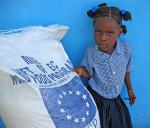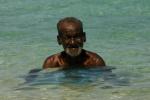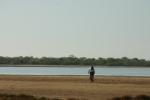WFP and The Hungry Times Ahead
 Though we are all different, we have this in common - we must eat to survive. In an ideal world, individuals, families, communities, and countries would be able to feed themselves. Needless to say, the world is less than ideal. For the poorest of the poor, climate change, population growth, environmental degradation and soaring food prices make feeding oneself increasingly difficult. The World Food Programme (WFP) plays a vital role in ensuring that vulnerable populations, including those affected by disaster and conflict, receive the food they need, in Haiti and worldwide.
Though we are all different, we have this in common - we must eat to survive. In an ideal world, individuals, families, communities, and countries would be able to feed themselves. Needless to say, the world is less than ideal. For the poorest of the poor, climate change, population growth, environmental degradation and soaring food prices make feeding oneself increasingly difficult. The World Food Programme (WFP) plays a vital role in ensuring that vulnerable populations, including those affected by disaster and conflict, receive the food they need, in Haiti and worldwide.











